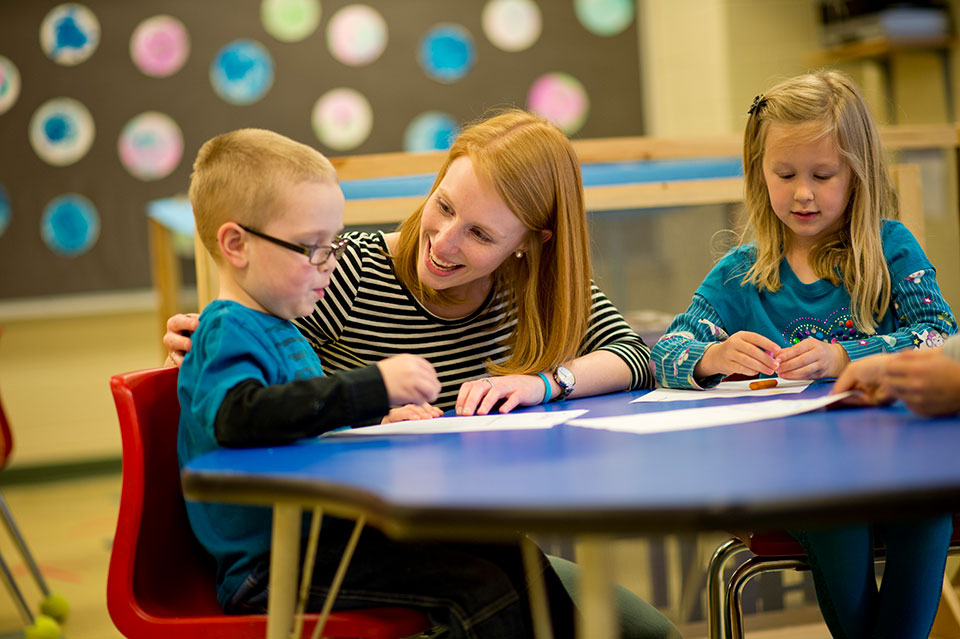Department of Human Development and Family Science Research
View Department
Research
The Department of Human Development and Family Science carries out a wide range of research aimed at improving quality of life for individuals and families across the entire life span. Research is divided into five main themes: culture and diversity, early childhood education and care, health and well-being, interpersonal relations and military families.
Research Centers
The Department of Human Development and Family Science promotes applied research that goes hand-in-hand with our engagement activities. The department’s research centers focus on solving real-world challenges, including finding quality child care, balancing work and family, improving relationships and aging-related issues.
Ben and Maxine Miller Child Development Laboratory School
The Department of Human Development and Family Science operates a preschool program in the Ben and Maxine Miller Child Development Laboratory School. This program offers child development practica and student-teaching experiences, fulfills a need in the community for high-quality early education and child care and provides a site for child development and early education research. The laboratory school was awarded a level-four rating from Paths to QUALITY, which is the highest indicator of quality.
Center for Early Learning
The Center for Early Learning is dedicated to improving the quality of early childhood education and care from birth through third grade. Through generating and disseminating high-quality research; providing professional development opportunities to teachers; and informing local, state and national policy through evaluation work, the center promotes school readiness and healthy development to have a lasting impact on children’s lives.
Center for Families
The Center for Families at Purdue University is a collaborative effort that focuses on improving the quality of life for families and strengthening families’ capacity to provide nurturing environments for their members.
Military Family Research Institute
Research on military families is conducted through the Military Family Research Institute (MFRI) at Purdue University to provide insight into the experiences of military members and their families. The institute also designs and implements outreach activities to assist military families in Indiana and beyond and strives to proactively build relationships with partners in both the military and civilian communities.
Research Labs
Antiracism, Resistance, Identity, Socialization, and Equity (ARISE) Lab
The ARISE Lab studies the race-related development of Multiracial Americans and Asian Americans. Our mission is to understand how discrimination and racial-ethnic socialization (i.e., communicating about race, ethnicity, and culture) play a role in identity development, mental health, and critical racial consciousness (e.g., awareness of racism, engagement in activism).
Contact: Annabelle Atkin
Biobehavioral Development Lab
The Biobehavioral Development Lab is dedicated to understanding how genetics, hormones, and prenatal and postnatal environments contribute to the development of child and adolescent behavior and family relationships. We use a variety of family-based research studies to gain insights for predicting and preventing adolescent substance use and improve child behavior and family relationships.
Contact: Kristine Marceau
Marks Lab
The Marks Lab uses behavioral and neuroimaging approaches to study individual differences in language, learning, and brain development. Our research explores the connections between spoken language skills and reading acquisition across children with diverse learning needs. In another line of work, we investigate how educational interventions impact literacy development. The ultimate goal of this research is to inform educational practices and improve academic outcomes for vulnerable learners.
Contact: Rebecca Marks
Resilient Families Lab
The Resilient Families Lab studies risk and resilience factors that contribute to mental health and wellbeing in families impacted by socioeconomic and sociocultural stress, with a focus on immigrant Latine and single mother families. In particular, we focus on youths’ positive adaptation with an emphasis on developmental strengths and resources within individuals, their families, and broader contexts.
Contact: Zoe Taylor
SHINE Lab
In the SHINE Lab, we study how young children and their families express and regulate emotions. We explore the social-emotional processes that foster family resilience and lead to healthy child development, in an effort to promote early mental health for all children. We use translational and strengths-based approaches geared toward rapid application, in an effort to generate questions and tools that advance early identification of mental health problems and decision-making.
Contact: Leigha MacNeill
Sleep and Developmental Studies Laboratory
The Sleep and Developmental Studies (SDS) Laboratory explores how sleep is developmentally consequential for families and individuals. With studies that inform early autism development, Alzheimer’s disease, veteran sleep, sleep problem treatment, and early childhood developmental trajectories, the SDS lab is on the cutting edge of developmental sleep research.
Contact: A.J. Schwichtenberg
Social Development Lab
In the Social Development Lab, we study how children think about people, groups, and society. Our research investigates the origins and development of moral concerns for fairness and justice, social identities and intergroup attitudes, and beliefs about social inequalities.
Contact: Laura Elenbaas